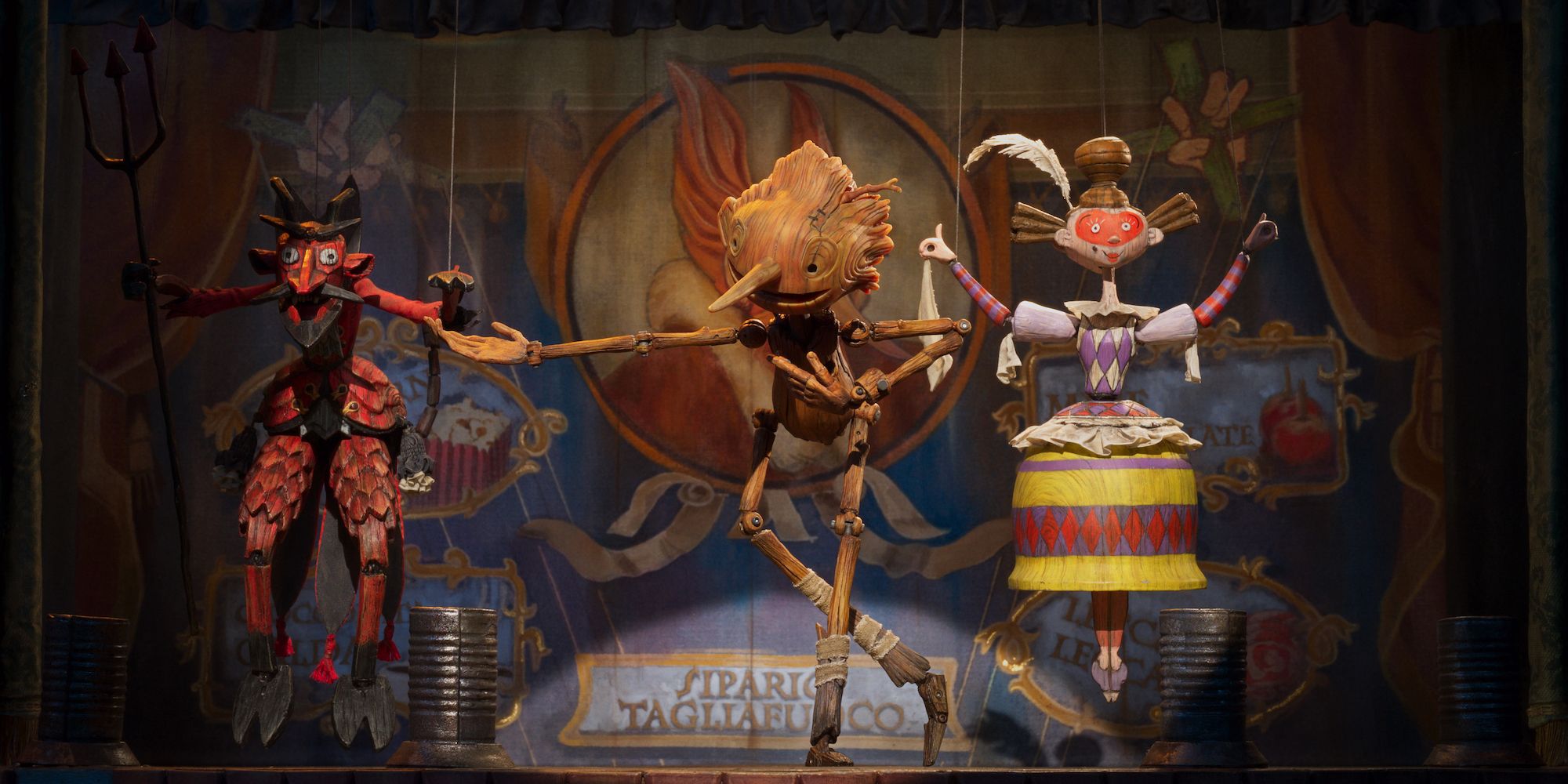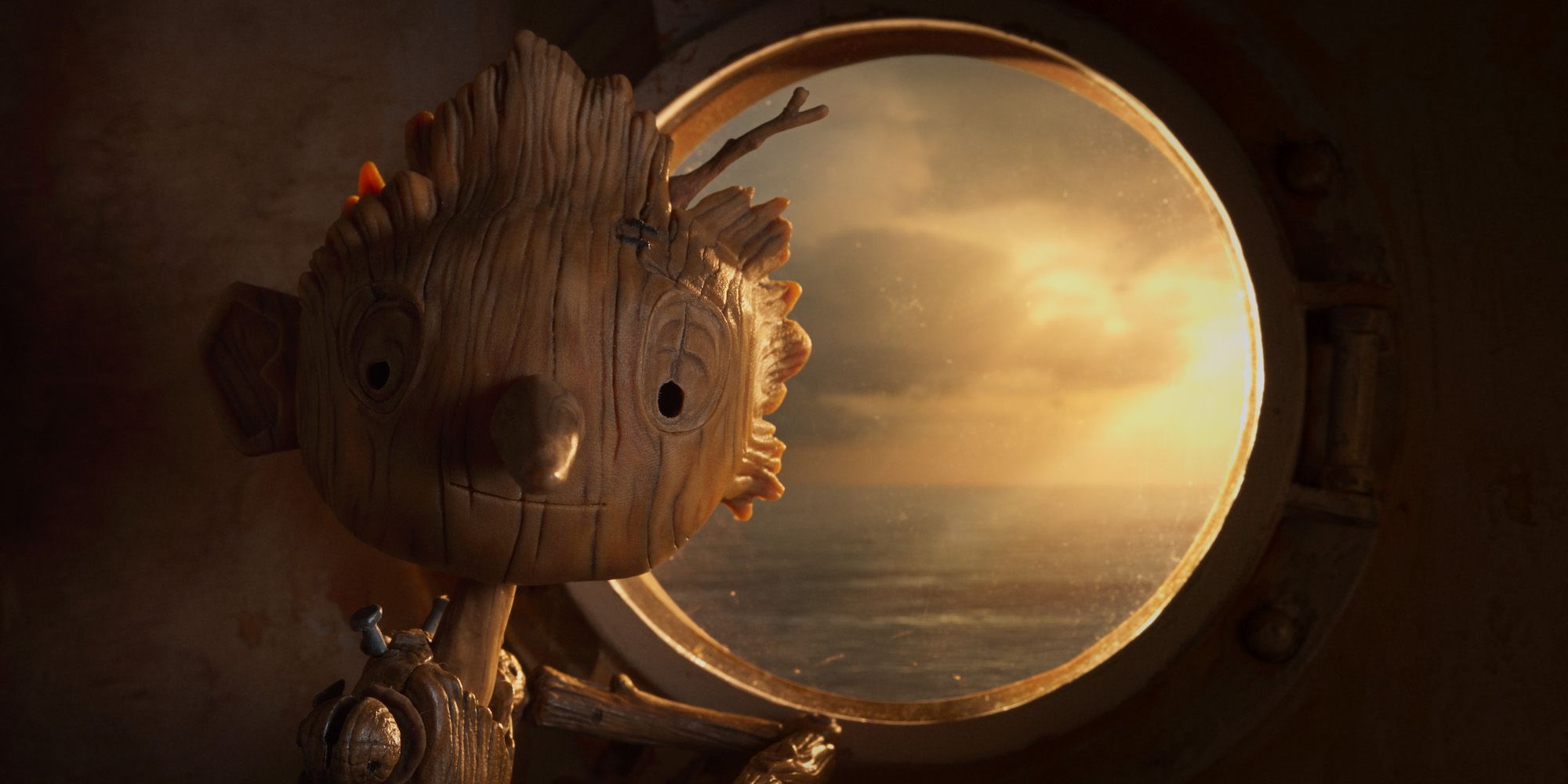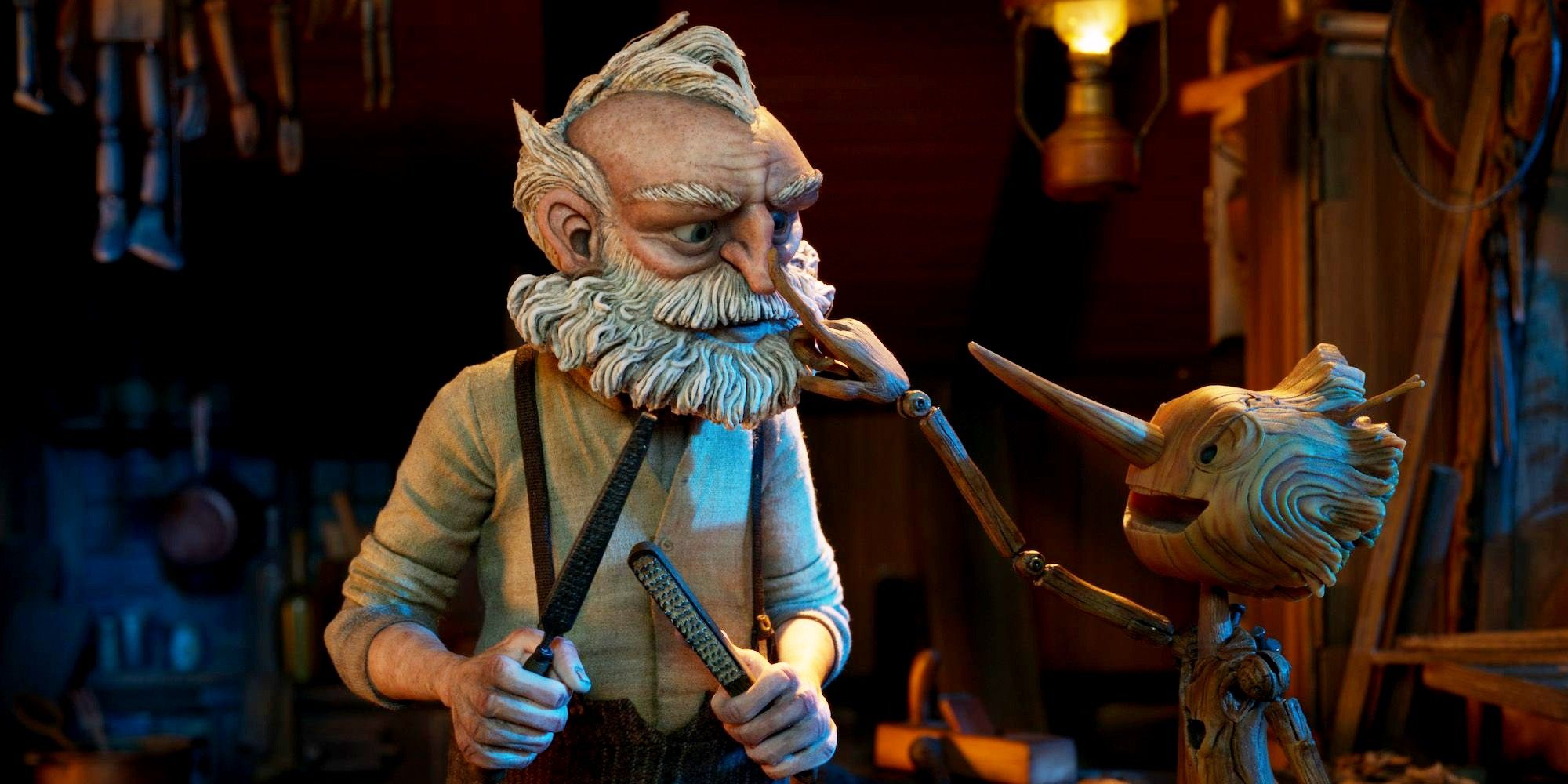Warning: This post contains spoilers for Guillermo del Toro’s Pinocchio
Guillermo del Toro’s Pinocchio is a new take on the familiar tale with the stop-motion animated movie that is filled with several songs that add to the film’s story. Similar to Disney’s Pinocchio, this iteration of the lively wooden puppet is filled with music that makes it stand out within the animated sphere, earning a Golden Globe and Academy Award nomination for Best Animated Feature. Directed by del Toro and Mark Gustafson, Pinocchio’s music is crafted largely by Alexandre Desplat, who previously worked with del Toro on The Shape of Water.
The stop-motion Pinocchio boasts ten songs that were created specifically for the film, with the film’s main song, “Ciao Papa,” written by composer Alexandre Desplat, lyricist Roeban Katz, and del Toro himself. Nine out of the ten songs are original, while one has a history behind it that blends with the stop-motion animated Pinocchio’s themes and story beats. Below is a full guide to the song titles.
- “My Son”
- “Everything Is New to Me”
- “We Were a King Once”
- “Ciao Papa”
- “Fatherland March”
- “The Late Lamented”
- “My Bubblegum”
- “Big Baby II Duce March”
- “Rataplan Delle Camicie Nere”
- “Better Tomorrows”
When Exactly Every Song Plays In GDT’s Pinocchio

“My Son” by David Bradley – “My Son” is performed by Geppetto at the start of del Toro’s Pinocchio. The song plays over a series of scenes that showcase how close Geppetto and his son, Carlo, are, which then sets the stage for the heartbreak that follows.
“Everything Is New to Me” by Gregory Mann and David Bradley – “Everything is New to Me” is sung by Pinocchio and Geppetto after the former is brought to life by the Wood Sprite. As Pinocchio enters the world of the living, he is learning about everything around him, as well as what not to do and how to act around others, which leads him to ask many questions about all this newness.
“We Were a King Once” by Christoph Waltz – “We Were a King Once” is sung by Count Volpe, right before he meets Pinocchio for the first time. Count Volpe laments about the days when his traveling circus and puppet shows were more successful, and he was raking in the money so easily compared to his current state. Shortly after the song, Volpe crosses paths with Pinocchio and plots to use him to get back on top.
“My Bubblegum” by Gregory Mann – “My Bubblegum” is performed by Pinocchio in his first show for Count Volpe, but before he goes on tour with him, having already signed an agreement.
“The Late Lamented” by Tim Blake Nelson – “The Late Lamented” is performed by the Black Rabbits after Pinocchio is killed for and sent to the afterlife to sit with Death before he returns to the land of the living.
“Ciao Papa” by Gregory Mann – “Ciao Papa” is perhaps the stop-motion animation’s centerpiece song, which is performed by Pinocchio after he decides to go on tour with Count Volpe’s show. “Ciao Papa” is played over a montage as Pinocchio travels from one Italian city to another, bidding farewell to Geppetto and expressing excitement about the adventures he will experience. The song is also performed while Pinocchio is onstage in front of large audiences.
“Fatherland March” by Gregory Mann – “Fatherland March” is performed by Pinocchio during Count Volpe’s puppet show. It’s meant as an ode to Italy and, crucially, to Benito Mussolini’s fascist ideology. It’s a song Count Volpe hopes Mussolini will love when he agrees to attend one of his shows. Though Pinocchio sings it proudly, he doesn’t quite grasp what it all means in the grand scheme of things.
“Big Baby II Duce March” by Gregory Mann – In a bid to anger Count Volpe and make him look ridiculous in front of Benito Mussolini, Pinocchio and the monkey Spazzatura come up with a twist on the lyrics to “Fatherland March.” The result is “Big Baby II Duce March,” which is performed by Pinocchio in front of Mussolini, who came to Volpe’s show to see the talking puppet with no strings in person.
“Rataplan Delle Camicie Nere” performed by Daniele Derra – “Rataplan Delle Camicie Nere” was an Italian fascist song that served as a call to war. It plays after Pinocchio has been taken by the Podestà and as an introduction to the youth camps he and Candlewick are forced to join.
“Better Tomorrows” by Ewan McGregor – “Better Tomorrows” is performed by McGregor’s Sebastian J. Cricket, and the song plays over the credits following the end of Pinocchio.
Why GDT’s Pinocchio Is Missing Some Big Songs

Going into del Toro’s Pinocchio, viewers may have expected to hear certain classic songs that are heavily linked to the story, including the Blue Fairy’s “When You Wish Upon a Star” and “I’ve Got No Strings.” However, del Toro’s Pinocchio is missing these big songs because they belong to Disney’s version of Pinocchio. The new stop-motion animation, though adapted from the same novel by Carlo Collodi, has no attachment to the Walt Disney animated film or its 2022 live-action adaptation. Since Netflix’s iteration of Pinocchio is its own thing, the songs featured in the film are tied directly to del Toro’s narrative (and what it changes from the original story).
Del Toro’s Pinocchio Is Nominated For An Oscar

Though the songs in the Netflix Pinocchio might not have been what fans expected, the acclaim for the movie has proven its success. Guillermo del Toro’s Pinocchio has been nominated for Best Animated Feature at the Academy Awards following its Golden Globe win in the same category. Though the songs themselves didn’t garner any nominations, they helped to tell this new take on a familiar story. Del Toro proved he was willing to play against audience expectations and use Pinocchio to tell a story that explored different themes, took the character in new directions, and created its own mythology while still being an entertaining and charming animated musical.




